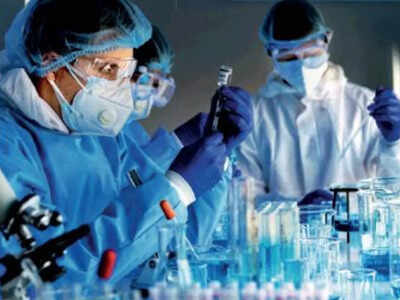Top Searches
- News
- City News
- mumbai News
- First run at Mumbai's new genome sequencing lab finds Delta variant in 70% of samples
First run at Mumbai's new genome sequencing lab finds Delta variant in 70% of samples

Representative image
MUMBAI: The maiden run of genome sequencing at BMC's new laboratory revealed the highly infectious Delta variant in almost 70% of the samples, said a BMC official on Monday. BMC additional commissioner Suresh Kakani said the civic body will now further analyse this data to understand how the Delta variant affected patients, their treatment and hospital stay.
The Delta variant, which was first isolated in the Vidarbha region, was responsible for the second Covid wave in India, and the ongoing third wave in countries such as the UK and the US.
Monday's results from the BMC's genome laboratory, inaugurated on August 4, are for the 188 samples of Covid-19 patients tested last week. A BMC statement said 128 of the 188 samples had the Delta variant, while 24 had the Kappa variant (also first isolated in India). Of the remaining samples, four were the alpha variant that was first identified in the UK, and the rest were other common Covid strains.
"Our tests underline that the Delta variant is the most commonly circulating variant in Mumbai," said Dr Jayanthi Shastri, who heads BMC's genome laboratory located within the Kasturba Hospital complex near Saatrasta. While the World Health Organisation classified Delta as a variant of concern, the Kappa variant is a variant of interest (and hence not capable of causing a wave).
Delta data may help hosp and treatment strategies
While the BMC gene sequencer can test 384 samples in one cycle, the public health department could gather only 192 samples (four were inconclusive) due to the decline in the second wave. “All our samples were taken from BMCrun hospitals. However, in the next round, we will take samples from private hospitals as well,” said Kakani.
BMC analysts are now gathering data on the128 Delta cases to understand how the variant affected the patients. “This interpretation will help us strategise hospital beds, home isolation and medication,” he added.
Kakani said a gene laboratory in Mumbai was much needed as samples from the city had to either be sent to Pune or Delhi and the results would take long. Having our own gene sequencer would help in early mapping of Covid variants and trends, he added.
The Delta variant, which was first isolated in the Vidarbha region, was responsible for the second Covid wave in India, and the ongoing third wave in countries such as the UK and the US.
Monday's results from the BMC's genome laboratory, inaugurated on August 4, are for the 188 samples of Covid-19 patients tested last week. A BMC statement said 128 of the 188 samples had the Delta variant, while 24 had the Kappa variant (also first isolated in India). Of the remaining samples, four were the alpha variant that was first identified in the UK, and the rest were other common Covid strains.
"Our tests underline that the Delta variant is the most commonly circulating variant in Mumbai," said Dr Jayanthi Shastri, who heads BMC's genome laboratory located within the Kasturba Hospital complex near Saatrasta. While the World Health Organisation classified Delta as a variant of concern, the Kappa variant is a variant of interest (and hence not capable of causing a wave).
Delta data may help hosp and treatment strategies
While the BMC gene sequencer can test 384 samples in one cycle, the public health department could gather only 192 samples (four were inconclusive) due to the decline in the second wave. “All our samples were taken from BMCrun hospitals. However, in the next round, we will take samples from private hospitals as well,” said Kakani.
BMC analysts are now gathering data on the128 Delta cases to understand how the variant affected the patients. “This interpretation will help us strategise hospital beds, home isolation and medication,” he added.
Kakani said a gene laboratory in Mumbai was much needed as samples from the city had to either be sent to Pune or Delhi and the results would take long. Having our own gene sequencer would help in early mapping of Covid variants and trends, he added.
FacebookTwitterLinkedinEMail
Start a Conversation
end of article

